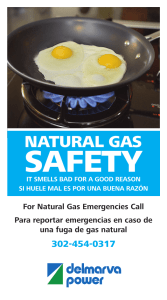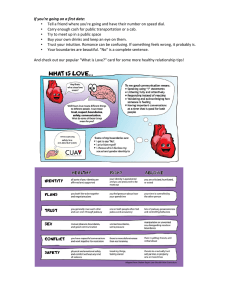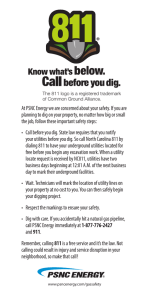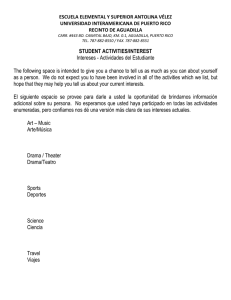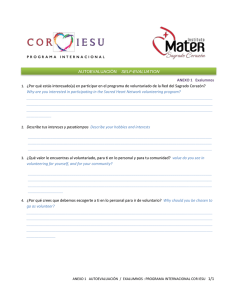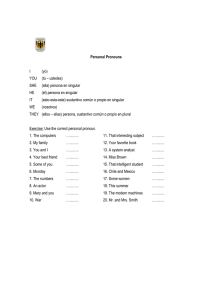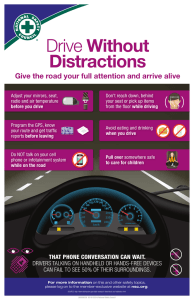Farm/RanchGranja/Rancho - Employee Wellness Programs
Anuncio
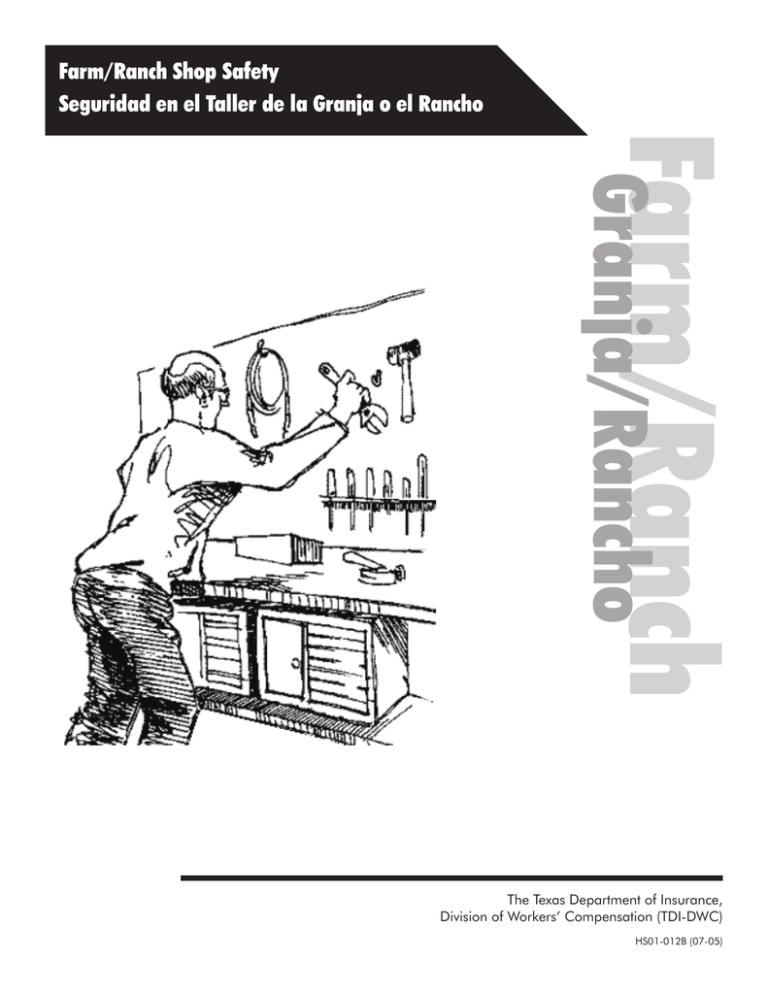
Farm/Ranch Shop Safety Seguridad en el Taller de la Granja o el Rancho Farm/Ranch Granja/Rancho The Texas Department of Insurance, Division of Workers’ Compensation (TDI-DWC) HS01-012B (07-05) Trabajando con Seguridad en el Taller de la Granja a el Rancho Working Safely in the Farm/Ranch Shop TAKE RESPONSIBILITY FOR SAFETY LA SEGURIDAD ES SU RESPONSABILIDAD Only you can prevent injuries. If you think about safety on every job you perform, it’s difficult to create a situation that will cause an injury. Avoid taking short-cuts and violating safety rules and practices. Paying attention to your job tasks is a positive step toward safety. Solamente usted puede prevenir lesiones. Si piensa sobre la seguridad en cada trabajo que desempeña, es difícil crear una situación que provocará una lesión. Evite tomar atajos y violar reglas y prácticas de seguridad. Prestar atención a sus tareas de trabajo es un paso positivo hacia la seguridad. DON’T USE DEFECTIVE TOOLS NO UTILICE HERRAMIENTAS DEFECTUOSAS Hand tools, such as socket wrenches, can become worn after they’ve been used for a long period of time. When you notice a socket with worn edges, it’s time to replace it. Screwdrivers, crescent wrenches, pliers, hammers: all of these and other tools need to be maintained in a serviceable condition. Equipment, such as hydraulic jacks, air wrenches, and grinders also must be properly serviced. Electrical equipment is of particular importance in the shop because there is the risk of electrical shock and/or fire if the equipment is in poor condition. Check for broken insulation, frayed cords and missing ground prongs. Also, inspect the air compressor on a regular basis to be sure its hoses, belts, pulleys and guards are in good condition. Las herramientas de mano, tales como llaves de tubo, se pueden desgastar después de que hayan sido utilizadas por un largo tiempo. Cuando nota que una llave tiene los bordes gastados, es tiempo de reemplazarla. Desarmadores, llaves de luna, alicates, martillos...todas estas y otras herramientas necesitan mantenimiento adecuado. Equipo, tales como gatos hidráulicos, llaves neumáticas, y afiladoras también tienen que mantenerse adecuadamente. El equipo eléctrico es de importancia particular en el taller porque existe el riesgo de choque eléctrico y/o incendio si el equipo está en malas condiciones. Inspeccione para aislamiento quebrado, cordones desgastados, y dientes a tierra ausentes. También, inspeccione el compresor de aire regularmente para asegurar que 2 LOCKOUT/TAG-OUT ANY DEFECTIVE EQUIPMENT CIERRE/ETIQUETADO EN CUALQUIER EQUIPO DEFECTUOSO If you find a piece of equipment that needs repair, notify your supervisor and follow your employer’s lockout/ tag-out procedures. Lockout/ tag-out simply means that all hazardous energy sources to the tool or machine, such as gas, electricity or hydraulic systems, must be locked in the off position before any maintenance is performed. The lock and key used for a lockout procedure should never be used for any other purpose. Use the lockout procedure whenever possible; only use the tag-out method when a lockout method is unavailable. A tag-out procedure means using special tags that warn others of the danger of starting up the equipment. A tag should be; Cierre/etiquetado simplemente significa que todos los peligros de fuentes de energía a una herramienta o máquina, tales como gas, electricidad o sistemas hidráulicos, tienen que estar cerrados en la posición de apagado antes de desempeñar cualquier mantenimiento. Si se encuentra una pieza de equipo que necesita reparación, avísele a su supervisor y siga los procedimientos de cierre/ etiquetado de su empleador. La cerradura y llave utilizadas para un procedimiento de cierre nunca deben ser utilizadas para cualquier otro propósito. Utilice el procedimiento de cierre siempre que sea posible. Solamente use el método de etiquetado cuando un método de cierre no está disponible. Un procedimiento de etiquetado significa el utilizar etiquetas especiales que advierten a otros del peligro de empezar el equipo. Una etiqueta debería ser; a. Durable – weather and chemical resistant b. Standardized – format shall be standardized c. Substantial – prevent removal without the use of excessive force d. Identifiable – indicates the identity of the employee applying the device a Durable – resistente al tiempo y a productos químicos b. Estándar – el formato debe ser estandarizado c. Sustancial – el ser estandarizado previene el retiro sin usar fuerza excesiva d. Identificable – indica la identidad del empleado que aplica el dispositivo 3 PROTECT YOUR EYES AND FACE PROTÉJASE LOS OJOS Y LA CARA This is one rule that is often violated in farm/ranch shops. Many people will wear safety goggles, but they forget to also wear the face shield. The primary reason for the face shield is for your protection in the event something, such as a grinding wheel, should explode. Prescription glasses from the optometrist are not safety glasses, unless you specify prescription safety glasses. Contact lenses in an agricultural environment are not recommended. Esta es una regla que es violada frecuentemente en talleres de ranchos y granjas. Mucha gente usará gafas de seguridad, pero olvidan usar una careta.La razón principal para la careta es para su protección en el evento de que algo, tal como una rueda de lijar, explote. Los anteojos de prescripción del optometrista no son gafas de seguridad, a menos que usted especifique anteojos de seguridad de prescripción. Los lentes de contacto en un ambiente agrícola no son recomendados. PROTECT YOUR FEET PROTÉJASE LOS PIES If you work in an area where major foot hazards are present, steel-toed safety shoes should be worn. In the event that something falls on your foot, protection is provided by these safety shoes. Where the hazard is minimal, it is recommended that you wear leather-topped shoes. Avoid tennis or canvas shoes. Leather-topped shoes afford some protection from oil, grease, solvents and other chemicals, and they also protect your feet from minor cuts and abrasions. Si Ud. trabaja en un área donde existen mayores peligros para sus pies se debe de usar zapatos de seguridad con puntas de acero. En caso de que algo caiga en su pie, los zapatos de seguridad le proporcionarán protección. Donde el peligro es mínimo, se recomienda user zapatos de cuero. Evite usar tenis o zapatos de lona. Los zapatos de cuero proporcionan alguna protección contra aceite, grasa, solventes y otros productos químicos, y también protegen sus pies de cortadas y lesiones menores. 4 WASH YOUR HANDS TO PREVENT DAMAGE TO YOUR SKIN LÁVESE LAS MANOS PARA EVITAR DAÑO A SU PIEL Los profesionales de mantenimiento regularmente trabajan con grasa, aceite y solventes. Esa es la naturaleza de su trabajo. Pero, para evitar daño a su piel, lávese las manos frecuentemente. Si está utilizando un solvente o líquido similar, use guantes de hule para proteger sus manos y su piel. Si se protege a usted mismo, va a ser más productivo y ciertamente mucho más seguro. Maintenance professionals work with grease, oil and solvents on a regular basis. That’s the nature of your job. But, to prevent damage to your skin, wash your hands frequently. If you’re using a solvent or similar liquid, use rubber gloves to protect your hands and skin. If you protect yourself, you’ll be more productive and certainly much safer. MANTENGA SU ÁREA DETRABAJO LIMPIA Si derrama algo, límpielo. Grasa, aceite, solvente, piezas de repuesto, alambres, herramientas en el piso....todos estos objetos pueden causar accidentes. La buena limpieza es una de las partes más importantes de sus responsabilidades diarias. Es lógico, y hace un área de trabajo más productiva, y mucho más segura. PRACTICE GOOD HOUSEKEEPING Keep your work area clean. If you spill something, wipe it up. Grease, oil, solvent, spare parts, wires, tools on the floor: all of these can add up to accidents. Good housekeeping is one of the most important parts of your everyday responsibilities. It makes good sense, it makes a more productive work area, and it’s much safer. 5 SELECT THE PROPER EQUIPMENT FOR THE JOB SELECCIONE EL EQUIPO ADECUADO PARA EL TRABAJO The employer must implement a respiratory protection program in accordance with 29 CFR 1910.134 for the employees who use respirators as required by this section. Employers must use only respirators approved by the National Institute for Occupational Safety and Health (NIOSH) under 42 CFR Part 84 to protect employees from dust during abrasive-blasting operations. Si los empleados necesitan usar respiradores, el patrón debe implementar un programa de protección respiratoria de acuerdo con 29 CFR 1910.134. Los patrones deben ulitizar solamente los respiradores aprobados por el Instituto Nacional de Seguridad y Salud Ocupacional (NIOSH, por sus siglas en inglés) bajo la parte 84 de CFR para proteger a empleados contra el polvo producido durante operaciones abrasives y explosivas. HANDLE AND STORE FLAMMABLE LIQUIDS WITH CARE MANEJE Y ALMACENE LÍQUIDOS INFLAMABLES CON CUIDADO Gasoline and other flammable liquids should be handled with extreme care. Always follow your employer’s (and the manufacturer’s) directions for using, handling, storing and disposing of these materials. All hazardous materials must be properly labeled and kept in proper containers. Never mix any chemicals without proper authorization. When you combine different chemicals, the result could be dangerous. To reduce the risk of spontaneous combustion and fire, store greasy rags in a metal container with a lid. When you transfer gasoline or other flammable liquid from a large container to a smaller container, you must bond and ground the two containers to prevent static electricity from creating a spark that could ignite the liquid. Ask your supervisor for assistance if you have questions about this procedure. It’s a good idea to regularly wipe up spills because flammable liquids are more dangerous when they mix with air. La gasolina y otros líquidos inflamables deben ser manejados con extremo cuidado. Siempre siga las indicaciones de su empleador (y el fabricante) para utilizar, m a n e j a r, a l m a c e n a r y deshacerse de estos materiales. Todos los materiales peligrosos tienen que ser marcados adecuadamente y mantenidos en recipientes adecuados. Nunca mezcle ningún químico sin autorización apropiada. Cuando combine diferentes productos químicos, el resultado puede ser peligroso. Para reducir el riesgo de combustión y fuego espontáneo, guarde los trapos grasosojs en un recipiente de metal con tapadera. Cuando transfiera gasolina u otro líquido inflamable de un recipiente grande a un recipiente más pequeño, Ud. tiene que enlazar y conectar a tierra los dos recipientes para evitar que la electricidad estática cause una chispa que puede encender el líquido. Pídale ayuda a su supervisor si tiene preguntas sobre este procedimiento. Es buena idea limpiar los derrames regularmente porque los líquidos inflamables son más peligrosos cuando se mezclan con el aire. 6 REPORT ALL INJURIES TO YOUR SUPERVISOR REPORTE TODAS LAS LESIONES A SU SUPERVISOR If a work-related injury or illness results in medical treatment beyond first aid, you must record it on the OSHA 300 Log. We want to make sure you receive proper medical attention for on-the-job injuries, so always report any type of injury or illness when it occurs. It is also recommended that you report to your supervisor any potential hazard you notice so it can be corrected. Si una lesión o una enfermedad relacionada con el trabajo necesita tratamiento médico más allá de los primeros auxilios, usted debe registrarla en el registro del OSHA 300. Queremos asegurarnos de que Ud. reciba atención médica adecuada por las lesiones que ocurran en el trabajo. Así que siempre reporte cualquier tipo de lesión o enfermedad en cuanto ocurra. También le recomendamos que reporte a su supervisor cualquier peligro potencial que Ud. note para que sea corregido. RESOURCES RECURSOS The Texas Department of Insurance - Division of Workers’ Compensation (TDI-DWC) Resource Center offers a workers’ health and safety video tape library. Call (512) 804-4620 for more information or visit our web site at www.tdi.state. tx.us. El Centro de Recursos del Departamento de Seguros de Texas, División de Compensación para Trabajadores (TDI-DWC, por sus siglas en inglés) ofrece una biblioteca de videos de salud y seguridad. Llame a la biblioteca al (512) 804-4620 para más información o visite nuestra página en la Internet: www.tdi.state.tx.us Safety module created by AgSafe. This publication is compiled from various reference sources and is designed to provide current and authoritative information on the subject matter covered. Information about the Agsafe Project can be obtained by writing to Agsafe, 140 Warren Hall, University of California, Berkeley, CA 94720. Módulo de seguridad producido por AgSafe. Esta publicación está compilada de diversas fuentes de referencia y está diseñada para proveer información actual y autoritaria sobre el tema cubierto. Información del Proyecto Agsafe se obtiene al escribir a Agsafe, 140 Warren Hall, University of California, Berkeley, CA 94720. The Texas Department of Insurance, Division of Workers’ Compensation (TDI, DWC) Safety Violations Hotline E-mail [email protected] 1-800-452-9595 or call 1-800-687-7080 for more information. 7 [email protected]
